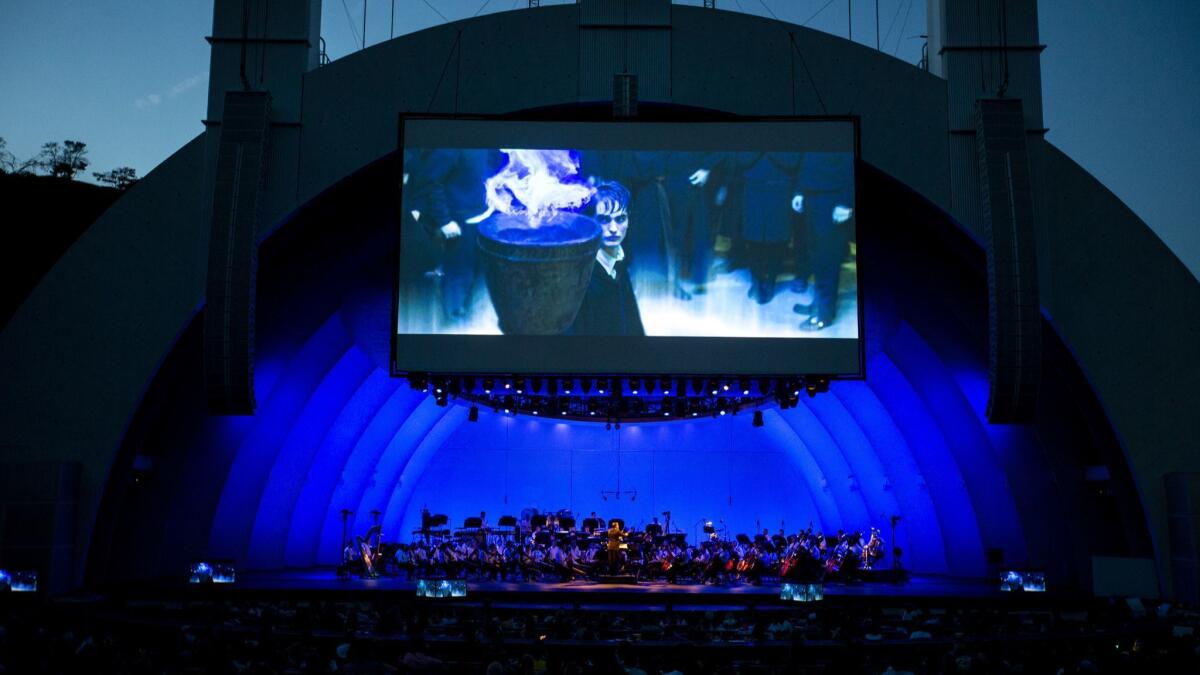Review: At the Hollywood Bowl, ‘Harry Potter and the Goblet of Fire’ concert highlights the magic of the music

Every year, the motion picture academy nominates five films in the original score category and for a few weeks, some notice is paid to the crucial role music plays in the best and most beloved movies.
Then, we all go back to either taking it for granted or complaining that it’s too loud, manipulative or distracting.
None of the “Harry Potter” films won an Oscar for original score, which is simply absurd until you remember that none of the “Harry Potter” films won an Oscar for anything. So while Hollywood Bowl’s now three-year commitment to presenting at least one “Potter” film accompanied by the Los Angeles Philharmonic is a smart and effective way to include families and young folks in the joys of the Bowl, it’s also an important reminder that behind every enduring film usually stands not just a fine composer but also a slew of talented musicians.
That applies especially to the eight “Potter” movies, as the LA Phil proved once again at the Hollywood Bowl’s “‘Harry Potter and the Goblet of Fire’ in Concert” Thursday night.
As trumpets blared and drums pounded to announce the Quidditch World Cup, as the strings slid as stealthily as Nagini the snake under the moments of tension, it was hard to know where to look — at the familiar faces on the screen or the women and men bringing Patrick Doyle’s score to life.
Doyle wrote an entirely original score that is a bit darker and, at times, more startling.
The heat, which crept steadily over the hills even as the sun set, discouraged many from wearing the robes and scarves that usually mark any Hogwarts-affiliated event, but there were plenty of Gryffindor, Hufflepuff, Ravenclaw and Slytherin T-shirts and more than a few pairs of those iconic spectacles in the audience. And when Justin Freer took the stage to introduce the film and do a roll-call of houses, the response was enthusiastic. (For the record Slytherin seemed to just beat Ravenclaw in cheers while Gryffindor affiliation appears to be on the decline.)
“Goblet of Fire” is the fourth of the “Potter” films and the first not scored by the legendary John Williams (though Williams’ work will be very much part of the Bowl summer program in “Jaws” and the “Star Wars” films “A New Hope” and “Empire Strikes Back”), and with the exception of a few snatches of “Hedwig’s Theme,” Doyle (“Gosford Park,” “Sense and Sensibility,” “Carlito’s Way”) wrote an entirely original score that is a bit darker and, at times, more startling, than the swooping, swirling strings of the first three films.
Which makes sense, since “Goblet” begins the darker turn of the “Potter” story; it opens with a murder, moves quickly to the Quidditch event and the Extremely Non-Helicopter-Parent-Approved Tri-Wizard tournament, following the main characters as they come to grips with young adulthood and the serious nature of Lord Voldemort’s return.
More important, at least to the young folks in the Bowl, it features Robert Pattinson as the handsome but doomed Cedric Diggory. (One has to wonder, given the level of intense reaction from the crowd the moment he appeared on screen, if there wasn’t at least some talk of bringing him back for the fifth film, as a ghost or an evil twin or something.)
Watching as the carriages from the Beauxbaton Academy fly over Hogwards and the ship from Durmstrang rises from the lake, it is impossible to not, for perhaps the 16 millionth time, wonder at the vividness of J.K. Rowling’s imagination and the dedication of the team that brought her world to the screen. The films, like the books, hold up to multiple experiences. The Great Hall is still amazing, the cast is still enchanting, the magic still magical, Voldemort remains one of the creepiest villains created and Alan Rickman, as Severus Snape, still has the best consonant usage in American film (“Don’t. Lie. To me.”)
Literally beneath and behind the main screen, Freer worked from a screen as well as a score, and the L.A. Phil unfurled Doyle’s sound across the Bowl, reminding Gryffindor and Slytherin alike that not all the key players were in the cast and that music is its own kind of magic.
More to Read
The biggest entertainment stories
Get our big stories about Hollywood, film, television, music, arts, culture and more right in your inbox as soon as they publish.
You may occasionally receive promotional content from the Los Angeles Times.











